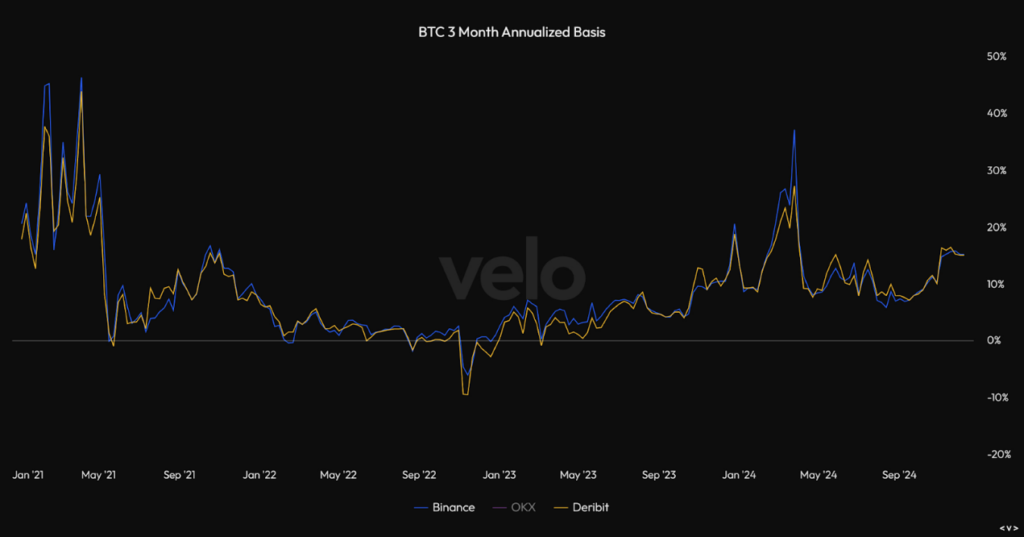This article will introduce 12 cycle determination tools and exit indicators to help investors identify market trends and potential exit opportunities, and grasp the top of the bull market. This article is based on an article written by analyst Ostium, compiled and translated by PANews.
(Background: Bitfinex: Bitcoin may peak in Q3-Q4 2025, with target prices ranging from $145,000 to $189,000)
(Additional background: Bull Market Goldmine: 6 Trading Rules to Improve Your Success Rate)
This article will introduce 12 cycle determination tools and exit indicators, most of which are little known. The detailed content is as follows:
PI Cycle
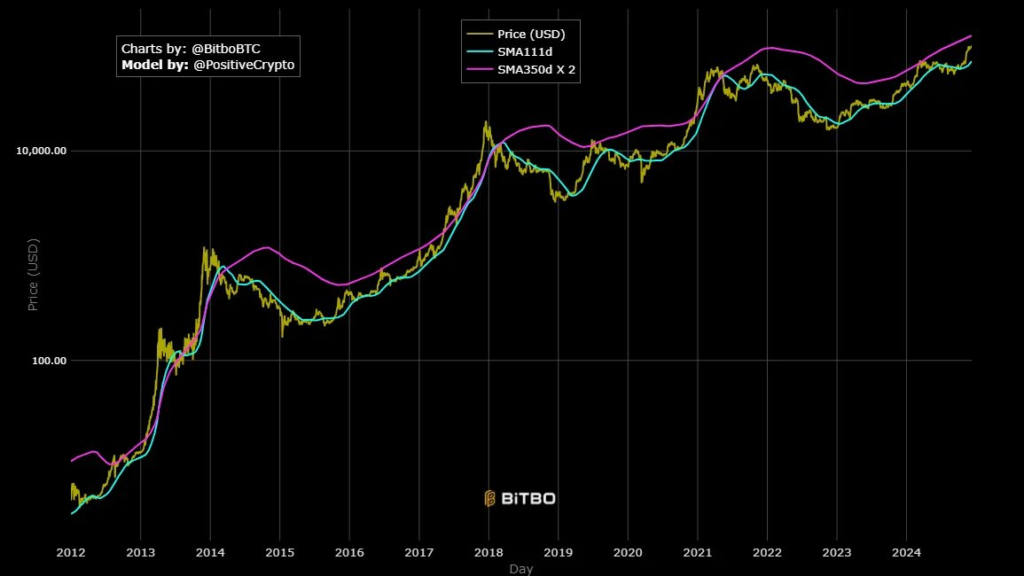
The PI Cycle top indicator has successfully captured the tops of the previous three cycles. The indicator uses a 111-day moving average (dMA) and 2 times the 350 dMA price. In the past three cycles, when the 111 dMA broke above 2 times the 350 dMA, it marked the top of the BTC/USD cycle. It is called the PI Cycle top because 350/111 = 3.153, which is close to 3.142.
It is expected that this time may be different, as the anticipated crossing price will exceed $400,000 (which is difficult to achieve), but we can expect a final euphoric phase after BTC reaches a price of 2 times the 350 dMA (currently around $126,000).
MVRV Z Score
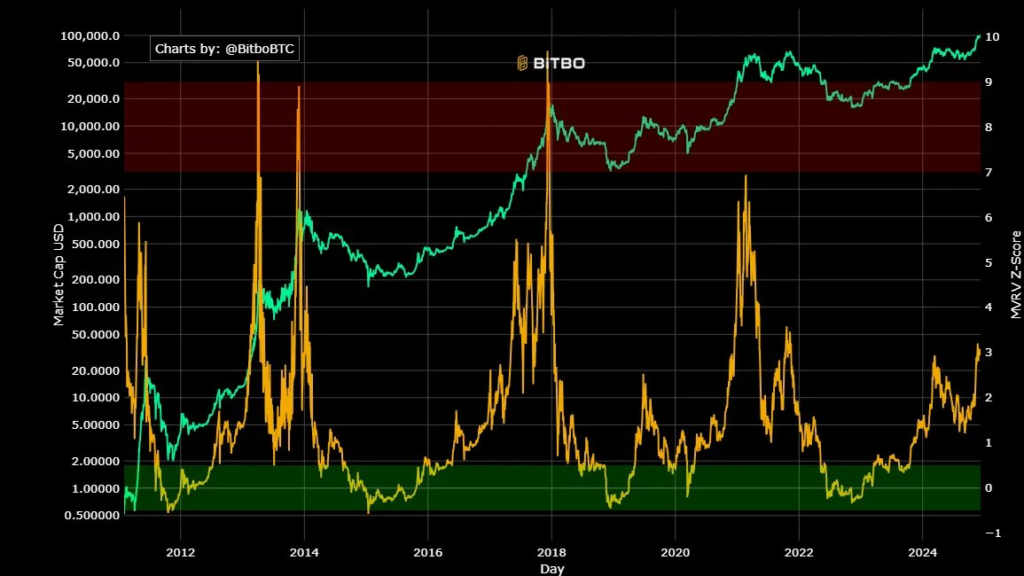
Another on-chain indicator previously emphasized is the MVRV Z-Score, which is a tool for assessing extreme bubble periods. The MVRV Z-Score can help identify the position where BTC may be extremely overvalued or undervalued relative to its fair value.
The indicator uses the market value (price x circulating supply) and realized value (average price of the last move of each BTC x circulating supply) of BTC, and calculates the Z-Score between them to identify extreme values.
Historically, the BTC/USD cycle high has formed within a few weeks of this ratio reaching its peak. It is expected that this cycle the indicator will reach at least 4; if it exceeds this level, it's time to start researching other exit indicators.
A more interesting version of this indicator, little known, is the Whale MVRV (holding 1,000 to 10,000 BTC), as shown in the image below:
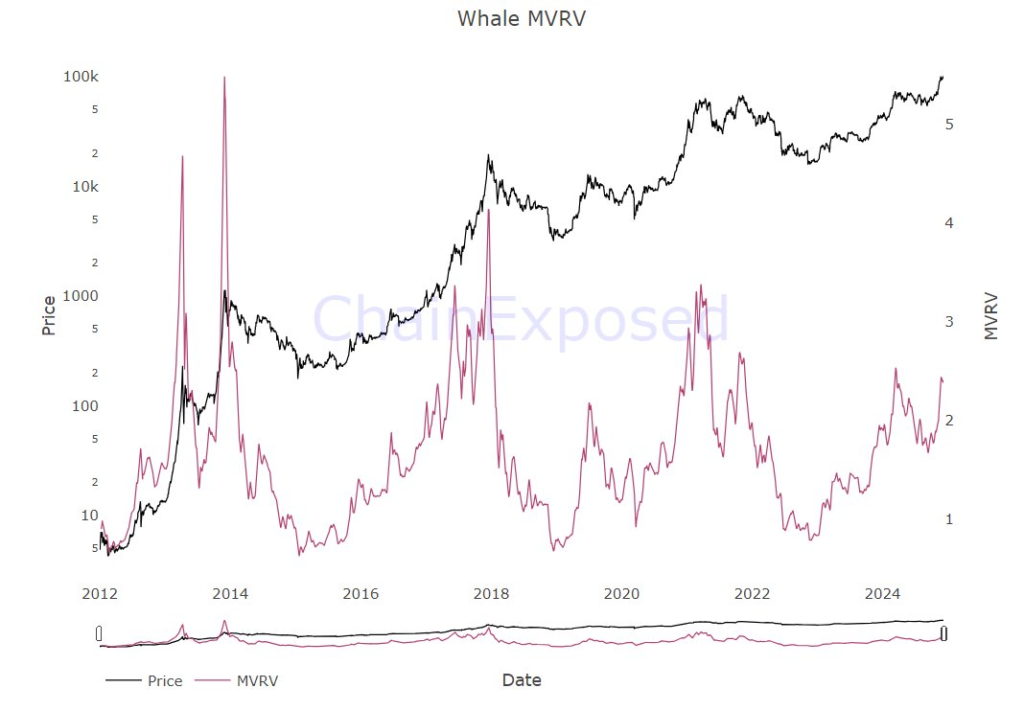
VAPLI and Decay Oscillator
The Volatility Adjusted Power Law Index (VAPLI) indicator is based on the concept of power law, measuring the deviation of BTC prices from the fitted power law curve, and adjusting for volatility to consider the changing market structure over time. Examining the chart below, we can see that the periods when this index pushes towards 100 and then turns and starts to decline are consistent with cycle tops. This number has once again broken through 100.
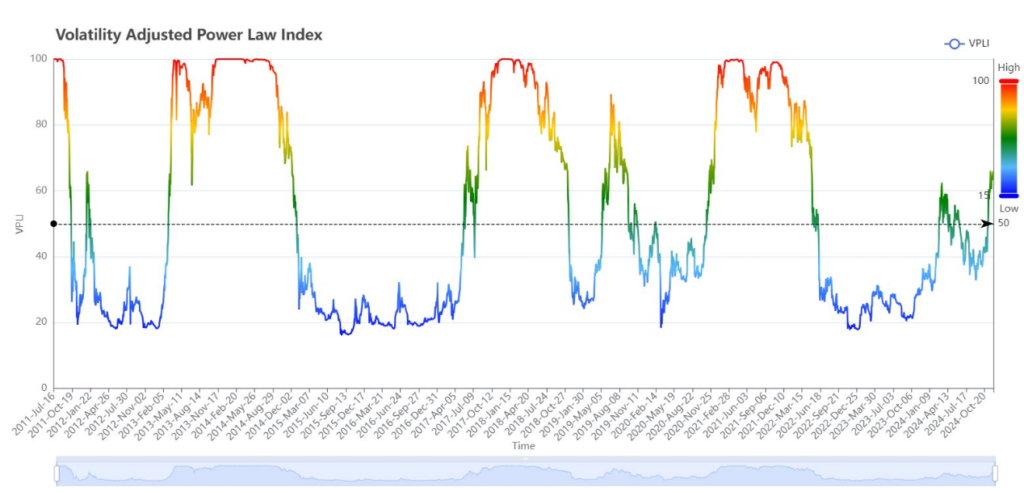
Similar to the volatility-adjusted power law, the Power Law Decay Oscillator below is modeled by Sminston With.
The peaks of this oscillator have almost locked in the tops of the previous few cycles, but obviously there is no way to definitively determine where the peak will be reached in real-time: but when this indicator reaches over 90%, and then look at other exit signals, the likelihood of being near your desired exit location is around 95%. Currently, this indicator is still below 60%, indicating that this market cycle is still in an uptrend phase:
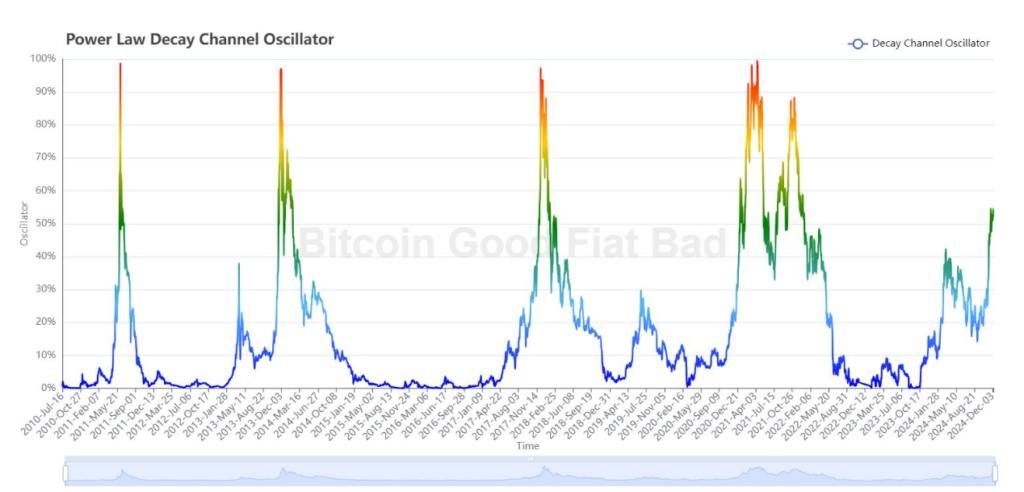
Mayer Multiple
The Mayer Multiple is the multiple of the price trading at compared to the 200 dMA. While the chart above is helpful, considering that volatility decreases over time, actually standardizing it is more helpful. The chart below shows the adjusted Mayer Multiple indicator. Currently, it is far from reaching the historical highs relative to the 200 dMA, in fact, it hasn't even returned to the highs of March 2024 yet. Expecting to surpass the March 2024 highs and move towards the 0.9 area:
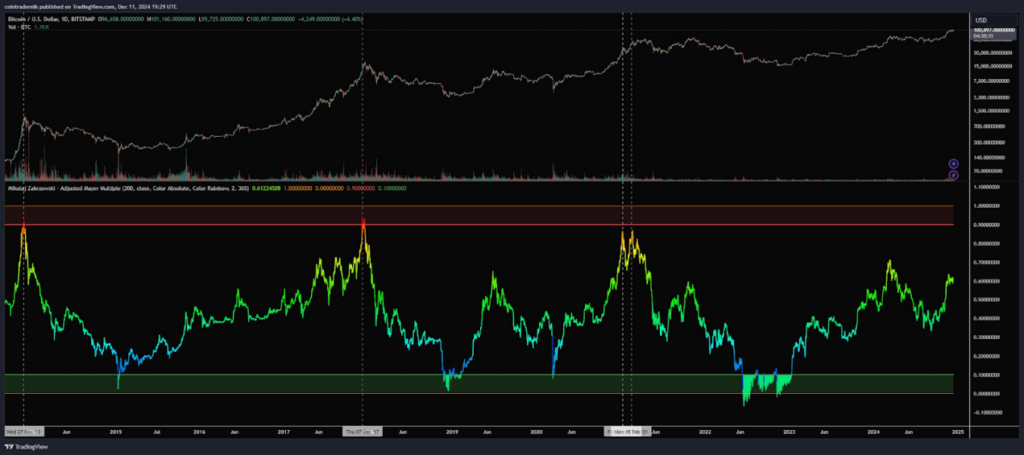
NUPL
NUPL, or Net Unrealized Profit/Loss, uses market value and realized value (as emphasized in the MVRV Z Score section above) by subtracting realized value from market value. It is then divided by market value, with the formula: (Market Value - Realized Value) / Market Value.
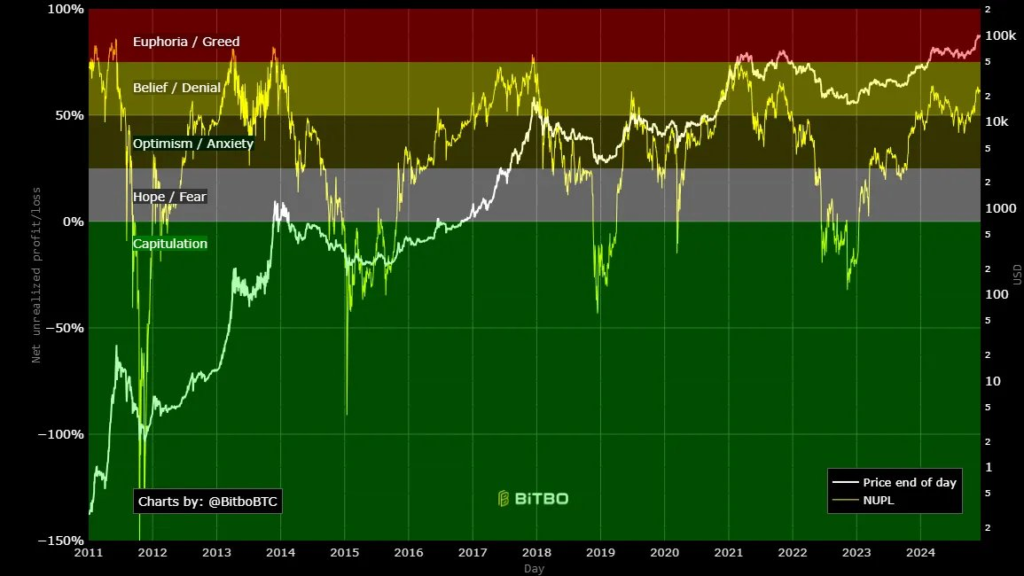
This chart can provide a visual understanding of market sentiment and the current stage of the market cycle. Historically, the cycle top is not far when it approaches or exceeds 75%.
Terminal Price
Terminal Price is a tool developed by analyst Checkmate. To calculate this indicator, the number of days of Bitcoin supply destruction is divided by the current Bitcoin supply and its circulation time. This is considered the "transfer price", which is then multiplied by 21.
The usage is simple, serving as a reference zone to ensure positions are proportionally adjusted - its current price is $180,000. This does not mean waiting for $180,000 to exit any long-term positions, but rather using it in combination with all other exit indicators. When looking for exit signals, more emphasis should be placed on the other on-chain indicators already discussed.
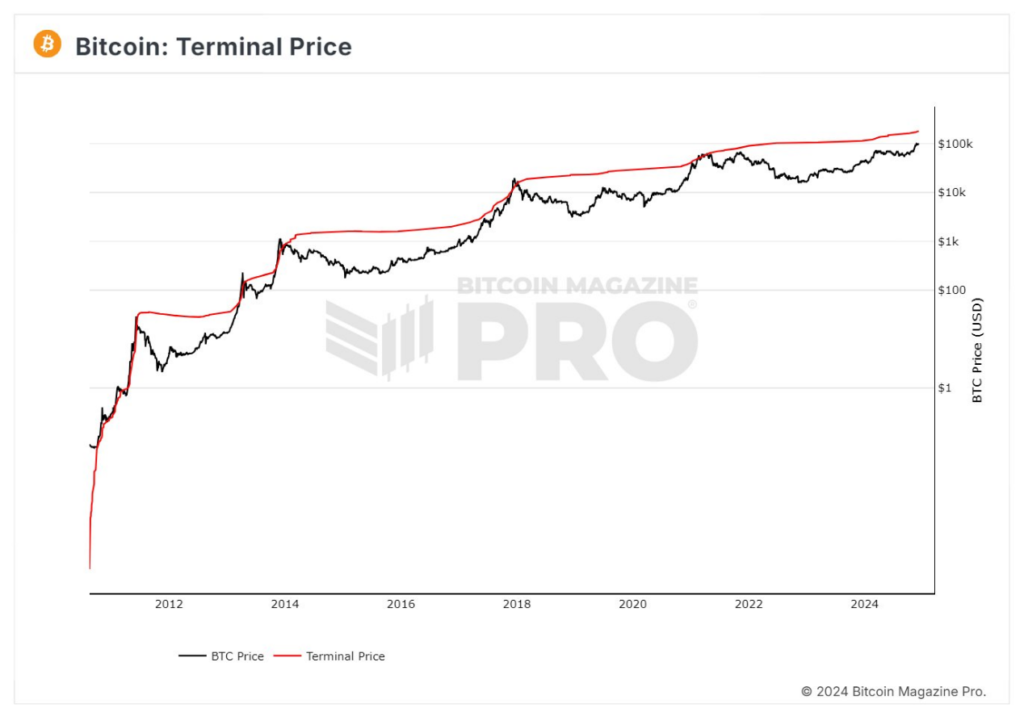
4-Year MA Multiple
The 4-Year MA Multiple is very simple: plot the 4-year moving average and calculate the degree of price deviation from that multiple. Historically, peaks have exceeded 4.5x the 4-year MA, but when the multiple approaches 4, all other exit indicators should be monitored:
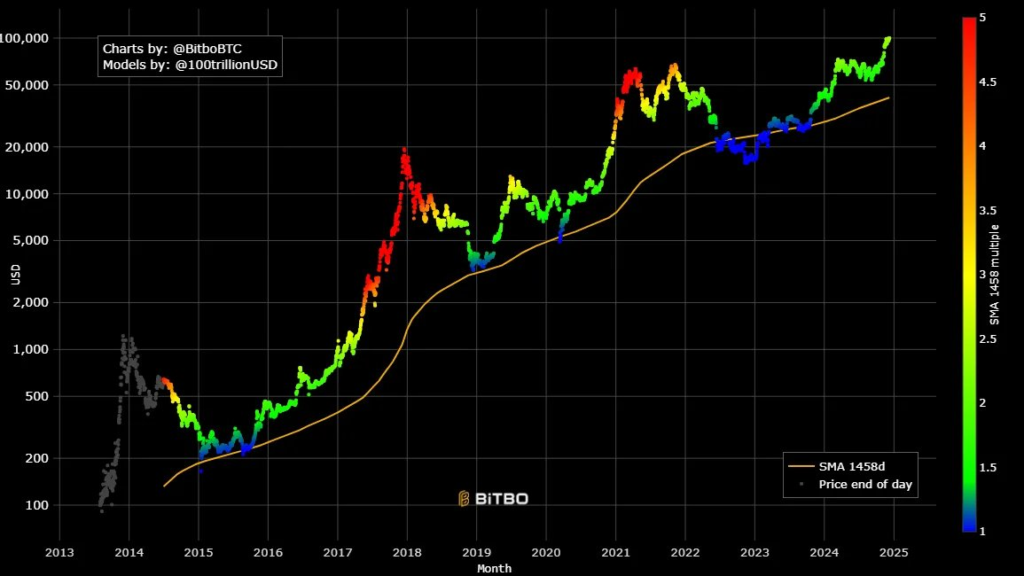
22-Day RSI
The 22-day RSI indicator is very useful, and 2-week or monthly RSI can also be used, but 22 days is particularly clear for major turning points. In fact, each time the 22-day RSI reaches a peak above 90, a cycle top has formed within the following 22 days (excluding the November 21 high).
You can reference BTC's 22-day RSI, and when it is above 90, you can consider exiting positions within the next 3-6 weeks:
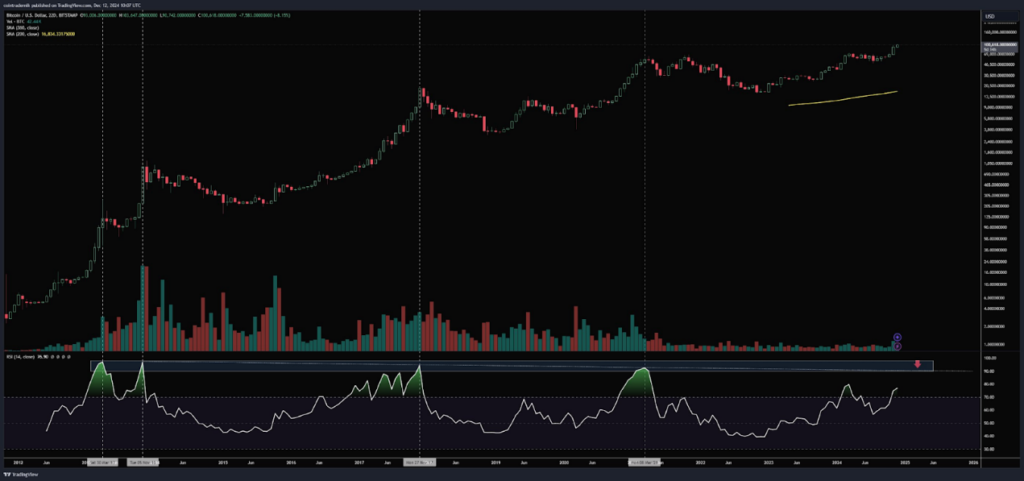
Coinbase/Phantom/Moonshot App Rankings
Now, there are many supporting evidences related to the cryptocurrency life cycle, and the Coinbase app store ranking being #1 in "All Apps" is a clear signal that the cycle peak time is upon us.
Phantom and Moonshot can serve as potential signals. Phantom being #1 in all apps would be an undoubted exit indicator. Typically, the Coinbase App Store ranking trend sees peaks and valleys in the last few months of the cycle, and when it reaches #1 in all apps, a major top often appears in less than 4 weeks. This indicator also needs to be used in combination with other indicators.
You can use AppFigures to track in real-time, or follow bots that provide daily updates on the Coinbase app store ranking. Bitcoindata21 also provides periodic updates with sentiment analysis.
Search Trends
Google Trends can be used to determine market sentiment and understand what the general public is interested in at any given time, but the most searched keywords are usually very basic, such as "Bitcoin" or "Cryptocurrency". You need to be more specific to truly get some signals. For example, keywords like BINANCE LOGIN, CHEAPEST CRYPTO, CRYPTO APP, COINMARKETCAP, BUY CRYPTO, CRYPTO PRICES, etc.
TOP X Market Cap
This is a method of evaluating the market cycle that has been monitored since 2020, and it has been very helpful in tracking the peak of the 2021 mid-cycle. If the expectation is for long-term growth in cryptocurrencies, then the market cap is expected to grow across the board. Regardless of the peak of the TOP 10, TOP 25, or TOP 100 tokens in the previous cycle, this cycle will surpass them before the peak arrives.
For example, in the previous cycle, to be in the top 100 by November 2021, a market cap of around $1.2 billion was required. Now, to enter the Coinmarketcap top 100, a market cap of $1.25 billion is needed. It has already slightly exceeded the previous cycle's peak. Based on the outlook for total market cap, a conservative expectation is that the top 100 market cap should reach around $2 billion before the cycle peak. Once this area is reached, there should be no doubt that it's time to start looking for exit opportunities.
3-Month Annualized Basis
The 3-month annualized basis is just a quick way to understand the derivatives market bubble, but it is more helpful in emphasizing when it is prudent to reduce risk, rather than completely exiting the spot investment portfolio at the expected cycle peak.
Nevertheless, historically, when the 3-month annualized basis exceeds 30%, the situation starts to become dangerous. This is because the bubble in derivatives tends to grow larger as the cycle peak (or even the mid-cycle peak) approaches, rather than shrinking.
